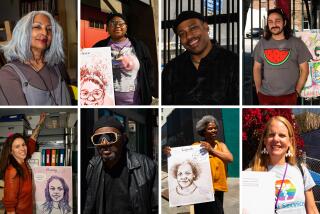Edward Howard, who brought movies, bathrooms and a sense of dignity to skid row, dies at 63
- Share via
Edward Howard was the student body president at his junior college in Detroit and a civil rights leader who revered the Rev. Martin Luther King Jr. and brought radical feminist activist and academic Angela Davis to campus.
In the 1980s, Howard came to Los Angeles, like so many others, for job opportunities and ended up managing a perfume and cosmetics counter at a Macy’s department store, and later was a caregiver for developmentally disabled people, before falling into drug addiction and landing on skid row, his brother Lee Howard said.
With his recovery at the Los Angeles Mission, Howard emerged once again as a community leader, this time pressing years-long fights with the city over providing homeless people on skid row with jobs, self-determination, bathrooms and hygiene resources.
Howard, who lived in a skid row residential hotel, died March 24 after battling congestive heart disease. He was 63.
The COVID-19 pandemic had lent new urgency to the community leader who brought movies and bathrooms to skid row. For Howard, bathrooms were always a civil rights issue and a matter of treating people with respect and dignity, friend Charles Porter said.
“He always said the community has the answers; what we lack are the resources,” Porter said, adding that his favorite expression was ”This is egregious and reprehensible” and his favorite King quote, “An individual has not started living until he can rise above the narrow confines of his individualistic concerns to the broader concerns of all humanity.”
Howard was known as Eddie H., reflecting his rejection of the legacy of trauma and oppression tied to names that owners bestowed on African American slaves, friends said.
“He took great pride in his blackness and his African names; Yao (an Akan name from Ghana given to males born on a Thursday) and Akinyemi (a Yoruba name from Nigeria, which means “the courageous one”), said Porter, who works with United Coalition East, a skid row community drug prevention project of Social Model Recovery Systems Inc.
Howard was a member of the Los Angeles Community Action Network, the Skid Row Community Improvement Coalition, the Skid Row Community Coalition and Black Lives Matter. He also worked his own street outreach ministry. All the positions were unpaid.
“He was a giver, even growing up,” his brother said.
While he avoided taking credit for his work, he was honored by the performance company Los Angeles Poverty Department as a skid row “visionary” at their Walk the Talk parade and festival.
He also helped bring a work source office to skid row to train community residents for jobs. In 2016, Howard advocated for outdoor films at Gladys and San Julian pocket parks on skid row. While some were apprehensive of the gatherings and feared they could incite violence, the movie nights proved to be highly successful, officials said.
“He was key in getting people excited and making sure little things were provided like the popcorn,” said Alisa Orduna, Mayor Eric Garcetti’s former director of homeless policy, who now works in a similar capacity in Santa Monica.
Howard was also active in protesting police sweeps and petty arrests in homeless encampments and in the skid row campaign to break away from the Downtown Los Angeles Neighborhood Council. The drive failed in 2017, ending in acrimony and litigation.
It was in the arena of skid row’s neverending battle over bathrooms for its homeless population that he made a lasting mark. He and other members of the Skid Row Community Improvement Coalition worked with the mayor’s office. And in December 2017, the ReFresh Spot, a 24-hour, community-run laundry, bathroom and shower center, opened in trailers in skid row.
Howard is survived by his son Darrius, daughter Dejah, sisters Mary and Lois, and brothers Lee and Darryl.
More to Read
Start your day right
Sign up for Essential California for the L.A. Times biggest news, features and recommendations in your inbox six days a week.
You may occasionally receive promotional content from the Los Angeles Times.








